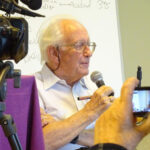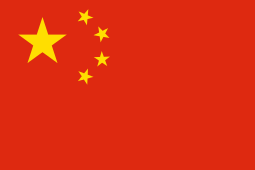Yin/Yang: China
EDITORIAL, 16 Dec 2024
#879 | Prof. Johan Galtung - TRANSCEND Media Service
Talk at the Beijing Foreign Studies University, Sep 2010
Excellencies, ladies and gentlemen – a great honor to be on a panel with the Director of CPC-CC Foreign Affairs, the Deputy Foreign Affairs Minister, the Editor-in-chief of China Daily, the Dean of the National Office of Chinese Language, the Deputy Commander of the People’s Liberation Army. I express my gratitude to the Chinese People’s Association for Peace and Disarmament and the American Friends Service Committee for having brought me to this tenth visit to China since 1973, and to Beijing Foreign Studies University for inviting me to this Forum on Public Diplomacy and China’s International Image.
I define public diplomacy as diplomacy for the people and by the people. The purpose is neither public relations nor propaganda, but to bring the peoples of the world together by making them understandable to each other. Like languages have their own logic, so do all countries, all nations.
China’s international image has moved from bad to ambiguous. The bad image was due to the revolution, seen as anti-West and anti-capitalist, to certain excesses, and to the general “yellow peril” theory based on size and “unpredictability”, meaning Western lack of understanding. The ambiguity is due to phenomenal growth–300 years of Western development in the 30 years after Deng Xiaoping’s SEZ reform, starting with Shenzen and farmers close to cities marketing their products directly–and to opening up. From 6 million bicycles in Beijing to 4 million cars in 20 years. From a collection of villages to a beautiful, well-functioning megalopolis.
This caught the West by surprise, and when they said Growth yes, but, with human rights and democracy deficits, environment damage, this was also to try to get a conceptual handle on something they did not understand by projecting Western logic on China.
There is a need for a deeper image of China, beyond knowledge of Chinese cooking, traditional medicine and martial arts. The big task is to explain the logic of China. And China has failed in doing so because China takes its own deep culture, the essence of China, for granted, and because China tries to explain China with Western logic.
Deep culture is basic to peace studies. My wife Fumiko Nishimura and I wrote close to 40 years ago a book, Learning from the Chinese People, published in several languages, using Chinese logic to understand; trying to answer three questions people ask about China.
- Why does China change policy so often, like from land reform to Great Leap Forward to Cultural Revolution to SEZ moderation and opening up and the oscillating between full steam capitalism and the moderation of for instance Hu Jintao’s great speech to the 17th CPC Congress October 2007, tackling inequality, environment problems and democracy deficits? Such changes seem to happen about every 9 years, with 1976-80 as a period of great confusion. Next basic change may be 2016; I have some intuition, but outside the theme of this conference.
- How is this growth possible, including lifting 400 million people from misery into lower middle class living in only, say, 14 years, and
- Will China exercise world dominance, taking over after the USA?
To the first question my answer has been, yes, there are these enormous changes, more so than in the West in general, but that is China. China is change, and always was. For China contradiction is normal, push any yin and a yang will come up. Nothing is final. This is the gist of Daoism, contradiction equals danger and opportunity; use the energy of the contradiction constructively. The West seeks a final state of affairs; China knows there is none and puts the ear to the ground to hear the rumblings of contradictions. This requires wisdom: Confucianism. Much of the dialectic between growth and distribution is carried by Buddhism. China is eclectic, san fa, three civilizations.
To the second question: a state-capital balance, capi-communism, has emerged, also Japan-inspired. Deng Xiaoping said: “Work together rather than quarreling about who is right.” In the West the USA stood for only capital-market, and the Soviets for only state-plan, and had a nuclear arms race over that dualism. China stands for combining the uncombinable, but then there will be contradictions, like between East and West in China, and between farmers close to and far from cities. To lift up a community China makes the public sector, private sector, the technical-science sector, civil society and the party cooperate. They are mostly kept apart in the West; bringing them together makes for enormous dynamism. But there will be contradictions; some will be lagging behind, to be articulated in human right terms, or in Chinese social harmony terms. Two languages that do not exclude each other.
As to the third question: from 500-1500 the world was Asia, and the “silk road” was trade on land and on sea, from China via India-Arabia to Somalia-Africa, less Europe (Assyrian for darkness). The classical idea of China was the territory between the Himalayas, the Gobi desert, the tundra and the sea, with problems of sovereignty and autonomy. But Han-China never went outside to conquer; outsiders came in. The dynamism was in time (dynasties), not in space (imperialism). China has much work to do, and things to explain, inside that major world pocket, and Hong Kong-Macao, China–one country two systems–is one effort to strike a yin-yang balance. Outside that pocket the Chinese logic is peaceful relations with respect for China. An imperial world design is alien to Chinese logic. But world harmony is as Chinese–Confucian particularly–as social and personal harmony. Let thousands of dialogues–the essence of democracy–blossom, inside and with China.
Can China explain itself forcefully, with a Chinese Davos in Hong Kong? And a Chinese CNN-BBC? Others have much to learn, as China from others, for mutual and equal benefit–the essence of positive peace.
____________________________________________________
Originally published on 13 Sep 2010 #129
 Johan Galtung (24 Oct 1930 – 17 Feb 2024), a professor of peace studies, dr hc mult, was the founder of TRANSCEND International, TRANSCEND Media Service, and rector of TRANSCEND Peace University. He was nominated for the Nobel Peace Prize numerous times and was awarded among others the 1987 Right Livelihood Award, known as the Alternative NPP. Galtung has mediated in over 150 conflicts in more than 150 countries, and written more than 170 books on peace and related issues, 96 as the sole author. More than 40 have been translated to other languages, including 50 Years-100 Peace and Conflict Perspectives published by TRANSCEND University Press. His book, Transcend and Transform, was translated to 25 languages. He has published more than 1700 articles and book chapters and over 500 Editorials for TRANSCEND Media Service. More information about Prof. Galtung and all of his publications can be found at transcend.org/galtung
Johan Galtung (24 Oct 1930 – 17 Feb 2024), a professor of peace studies, dr hc mult, was the founder of TRANSCEND International, TRANSCEND Media Service, and rector of TRANSCEND Peace University. He was nominated for the Nobel Peace Prize numerous times and was awarded among others the 1987 Right Livelihood Award, known as the Alternative NPP. Galtung has mediated in over 150 conflicts in more than 150 countries, and written more than 170 books on peace and related issues, 96 as the sole author. More than 40 have been translated to other languages, including 50 Years-100 Peace and Conflict Perspectives published by TRANSCEND University Press. His book, Transcend and Transform, was translated to 25 languages. He has published more than 1700 articles and book chapters and over 500 Editorials for TRANSCEND Media Service. More information about Prof. Galtung and all of his publications can be found at transcend.org/galtung
Tags: ASEAN, Asia and the Pacific, BRICS, Belt and Road, China, Cooperation, Diplomacy, Global South, Yin Yang
This article originally appeared on Transcend Media Service (TMS) on 16 Dec 2024.
Anticopyright: Editorials and articles originated on TMS may be freely reprinted, disseminated, translated and used as background material, provided an acknowledgement and link to the source, TMS: Yin/Yang: China, is included. Thank you.
If you enjoyed this article, please donate to TMS to join the growing list of TMS Supporters.

This work is licensed under a CC BY-NC 4.0 License.
Join the discussion!
We welcome debate and dissent, but personal — ad hominem — attacks (on authors, other users or any individual), abuse and defamatory language will not be tolerated. Nor will we tolerate attempts to deliberately disrupt discussions. We aim to maintain an inviting space to focus on intelligent interactions and debates.
